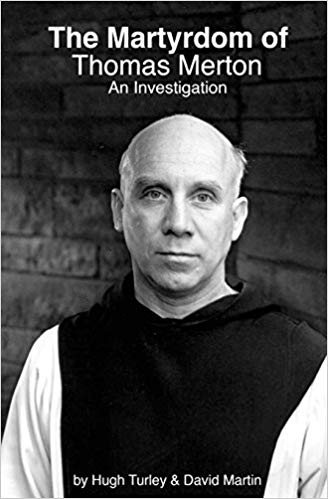Monday, December 10th marks the 50th anniversary of Thomas Merton’s death—which has now been confirmed as a martyr’s death by the recent solid and important investigative study, The Martyrdom of Thomas Merton by Hugh Turley and David Marin (as well as by my own encounters over the years with three CIA agents who were in Southeast Asia at the time).
A martyrdom (consider the recently canonized Archbishop Romero or the martyrdom of Sister Dorothy Stang, an eco-saint) is not about a death any more than Jesus’ martyrdom on the cross of the empire of his day was about his death or Dr. Martin Luther King’s martyrdom was about his death. It is about one’s life and teachings: What Good News is someone bringing into the world that so threatens the powers that be that they must hire assassins to silence the teacher?
In Thomas Merton’s case, there is much that he was preaching and teaching that we need to hear still today. I have tried to lay that out in my recent book, A Way To God: Thomas Merton’s Creation Spirituality Journey. Here I will summarize just some of his challenges to our awareness.
--He stood strongly with Dr. King and the civil rights movement--indeed, he and King were scheduled to have a retreat together at his monastery along with Thich Naht Hanh the weekend King was murdered. King cancelled the retreat offering a “rain check” in order to march with the garbage workers in Memphis. A “fateful” decision, as Merton commented in his journal following the assassination.
--Merton stood with those who opposed the Vietnam War and coached the Berrigan brothers about the ways of non-violent resistance. His last public lecture, delivered three hours before his death, was entitled “Karl Marx and Monasticism”—not the most prudent of topics to lecture on in Southeast Asia at the height of the Vietnam War.
--Merton was a pioneer in the interfaith or deep ecumenism movement—which is why he took his fateful journey to Asia where he met, among others, Hindu and Buddhist leaders including the Dalai Lama, He interacted with Rabbi Abraham Joshua Heschel and Rabbi Zalman Schactner, and it was in his encounters with Dr. D. T. Suzuki (who admired Eckhart profoundly) that Merton was opened up to the wisdom and power of Meister Eckhart, about whom Merton said, “whatever Zen is, it is there in Eckhart.”
--Merton stood up with Rachel Carson and celebrated what we now consider the beginnings of the Ecological movement when her book, Silent Spring, came out. He praised her for her research about DDT and the other poisons we were putting into the soil: that explained for him the disappearance of so many birds from the monastery farm.
--Merton criticized his own church on numerous occasions, speaking of a “spiritual sickness” within it and the “glorified infantilism” that always looks to hierarchy for answers. In an Easter Sunday sermon delivered to his fellow monks he wondered aloud if Christianity has become a “cult of the dead body of Christ.”
--Merton had an 18-month correspondence with a young and upcoming feminist Catholic theologian, Rosemary Ruether, that revealed his humility and willingness to learn from women’s experience.
--Merton’s conversion in 1958 from being a dualistic monk in the Augustinian tradition to being a prophetic Christian happened under the influence and inspiration of Meister Eckhart whom he called “my lifeboat.”
--Merton criticized the decision to go to the moon in the following language: “Even if we can fly, so what? There are flying ants. Even if man flies all over the universe, he is still nothing but a flying ant until he recovers a human center and a human spirit in the depth of his own being….What can we gain by sailing to the moon if we are not able to cross the abyss that separates us from our selves? This is the most important of all voyages of discovery, and without it all the rest are not only useless but disastrous.”
--Merton predicted that the marriage of religious fundamentalism and American nationalism would produce “the greatest orgy of idolatry the world has ever seen.”
--Merton wrote extensively of the Cosmic Christ such as the following: “The Blinding One….speaks to us gently in ten thousand things….He shines not on them but from within them.”
--Merton of course led a disciplined inner life and taught people how to meditate and contemplate. Here is one definition of contemplation that he offers us: “Contemplation is the highest expression of man’s intellectual and spiritual life. It is that life itself fully awake, fully active, fully aware that it is alive. It is spiritual wonder. It is spontaneous awe at the sacredness of life, of being. It is grateful for life, for awareness and for being.”*[1]
Speaking personally, it was in correspondence with Merton in 1967 that I was advised to pursue doctoral studies in spirituality at the Institut catholique de Paris. It was there that I met my mentor, historian Pere M.D. Chenu, who named the Creation Spirituality tradition for me. So I owe Merton, big time. In a real sense all the trouble—and the joy-- I have gotten in since I owe to Thomas Merton.
This is a short list of many of Merton’s gifts to us.
Thank You, Thomas Merton!
Thank you for your life, your teachings, your wonderfully artistic writings, your courage and your death. May we all be so alive and giving and generous.
[1] All citations are from Fox, A Way To God: Thomas Merton’s Creation Spirituality Journeye



